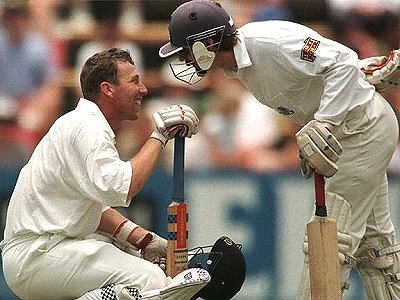
WHY THE CHURCH OF ENGLAND REMINDS ME OF THE ENGLAND CRICKET TEAM IN THE NINETIES
A decade of not being up to the mark didn’t leave quite the impression you would expect
Was there anything worse than being a fan of the England cricket team in the 1990s? It felt like the opposition were always 350 for 2 or England 127 for 7. The sad thing for me was that I cared more about the state of English cricket then than since, when things have been better. Today, the loss of cricket to terrestrial TV means the drama is not shared how it used to be. The multiplication of fixtures ensures we are less bothered by defeat as another game is always around the corner. The emergence of T20 (a Fresh Expression of cricket) shows the game is evolving more rapidly than ever. In a customer-led era, no-one quite knows what this means for its future.
Cricket’s impenetrability has long caused bewilderment and mirth among the uninitiated, affording nerd status to its fans. If I was such for following England in the 90s (30-something married bloke), could anyone, anywhere, out-nerd Emma John for her love of this team? A teenage girl with hopeless devotion, unspeakably bad taste and a crush on Michael Atherton who would pin up posters of Chris Lewis and Jack Russell in the bedroom while her friends admired Bros or Oasis? This was a truly niche fetish.
Thankfully she has no enduring shame about her story and has told it joyfully and perceptively in her book Following On, one which bears favourable comparison with Nick Hornby’s Fever Pitch, that did so much to explain football fandom to those who could not get it. As a journalist with access to the players, she has cast new light on an undistinguished era and how they coped with unrelenting failure. It surprised her to find they do not feel defined by their failings. Some look back with fondness; others have put it behind them. All have moved on.
The second thing to say is that this decade was marginally more successful for England than the one that preceded it in the 80s. This usually surprises people because they associate this earlier team with big stars: Botham, Gooch, Gower, Gatting, Willis – overlooking some serious destruction by the West Indies. We recall the overwhelming strength of the Australians in the 90s (England’s instinctive yard-stick for success) where every batsman would score a hundred and Steve Waugh would pass the ball to McGrath and Warne, waiting patiently at slip for up to an over before it all came apart. But it was not always like that against other countries.
So, here’s my thesis on the Church of England now and the England cricket team back then. The Church of England has a sense of being up against things (snap). It has good people doing many great things in their own way, despite the public image (ditto). The climate in which it works can feel hard and unyielding (media images of the Church smirk like Shane Warne twenty-two yards away). It will not be defined by the struggle (many of England’s players made a big impression: Atherton, Stewart, Thorpe, Cork, Gough). Things change; history is not a linear progression (in a matter of years, England would become world-beaters).
Those Anglicans (and other Christians) who feel gloomy might want to look at it this way. Just how good would Mike Atherton have been if he’d played for Australia where the bowlers would have had his back? Context counts for more than we accept, in this era of the individual. In a time of spiritual revival, most of us would fly.
The Church may feel wobbly but the Kingdom of God is always growing, like fresh grass in the spring rain. One Day we will know what it feels like to play for Australia and look back with fondness at the struggle. And move on.
POPULAR ARTICLES

Obama's Covert Wars
The use of drones is going to change warfare out of all recognition in the next decades.

Through A Glass Starkly
Images of traumatic incidents caught on mobile phone can be put to remarkable effect.

What Are British Values?
Is there a British identity and if so, what has shaped the values and institutions that form it?


